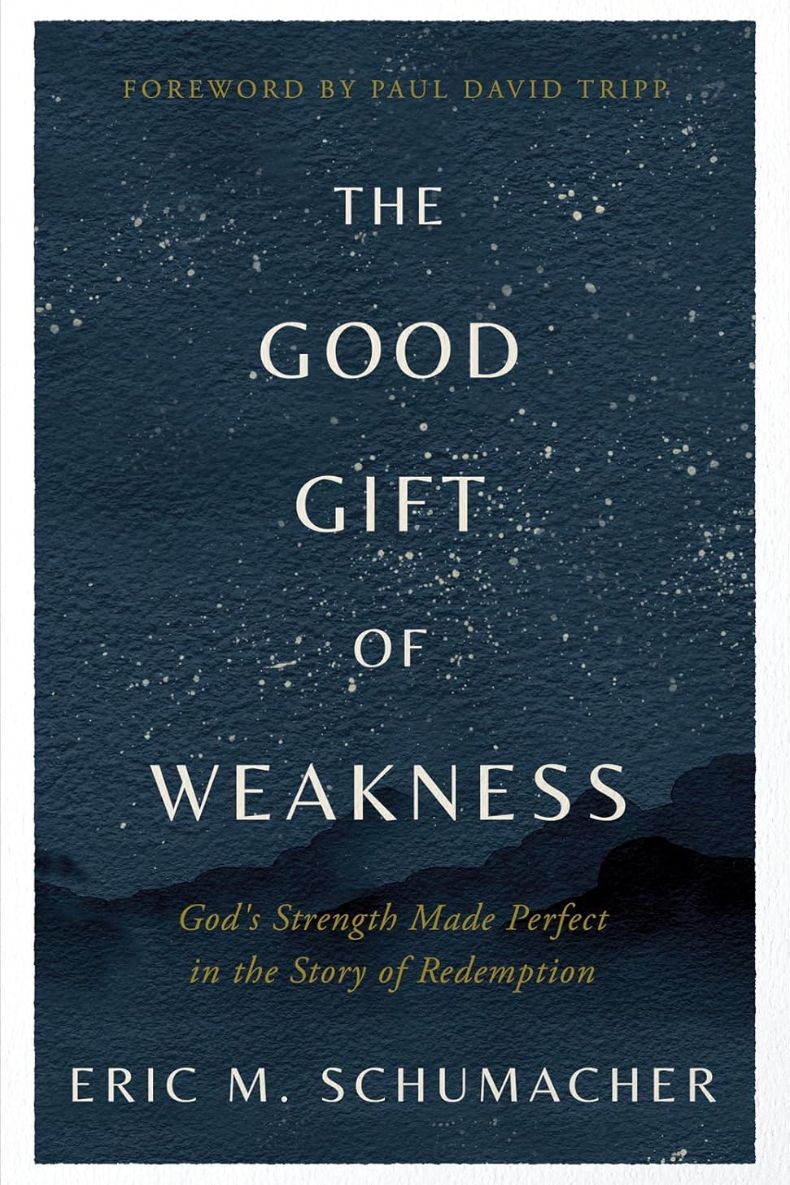The Good Gift of Weakness: God’s Strength Made Perfect in the Story of Redemption, by Eric M. Schumacher. Eugene, OR: Harvest House Publishers, 2024. 272 pp. $15.00.
Eric Schumacher is an author, podcaster, songwriter, and pastor who has served in pastoral ministry for over two decades. He is also currently the pastoral ministry director for the Baptist Convention of Iowa. Among his publications, he is the co-author of Worthy (2020) and Jesus and Gender (2022) and the sole author of Ours (2024) and My Last Name (2021).
What is weakness? If weakness is a gift, what kind of gift is it? The author defines weakness as “the inability to act or produce an effect. In short, a weak person is one who cannot do things or make things happen. That’s us—weak” (15). The author goes beyond the contextual treatment of words for weakness in Scripture to treat the broader theme or concept of weakness. A near synonym for weakness the author uses frequently is dependency and related terms such as vulnerability. He frequently describes weakness as the way God provides for and protects his people. Stepping back to get the big picture, weakness is the central role human frailty plays in the redemption story. Under this rubric, the author breaks down weakness taxonomy into three subcategories: (1) Natural weakness is our inherent inability as created beings. We are born weak because we were created weak. In the truest sense we are weak by God’s design. He intended us to be weak when he created us. (2) Consequential weakness is introduced or magnified by the entrance of sin. Sin devastated us! A derivative of consequential weakness is moral weakness, our moral depravity resulting from the fall. The whole creation groans in weakness. (3) Relative weakness is our inability in comparison to others. Relative weakness will pop up throughout the Bible as we think about “the weak” in contrast to “the strong” in human terms (15).
All uses of the term weakness and related words as well as the broader theme or concept of dependency should fit into one of these three categories, perhaps more than one. With this framework in place, the author surveys Scripture from beginning to end. Schumacher’s study clarifies many difficulties in our understanding of sin. This reader is encouraged by the author’s discussion under the heading, “We depend entirely upon God for our purpose” (19). In short, Christ followers are
rulers of the whole earth and priestly servants of God. That’s a high calling. But notice that—it’s a calling. It’s not something we won in battle, purchased with wealth, earned with service, or obtained through a popular vote. It’s a purpose bestowed upon us by God. Apart from his declaration, we have no purpose. Our purpose, like our existence, comes from outside of us, from God. God alone possesses ruling authority in himself. Any we have comes from him. God alone determines who serves in his presence. If we find ourselves there, it is a precious gift (20).
How might this explanation of purpose apply to our soul care? We can offer this explanation with its appeal to someone ideating suicide or suffering with the isolation and pain of disability. In fact, this view of life should encourage any Christian regardless of how difficult their circumstances might be.
The book’s invitingly readable style makes a complex concept like weakness approachable and engaging for readers unfamiliar with the implications of weakness. This study is spiritual food for all who bow weakly before an omnipotent Lord. The author’s comprehensive treatment of weakness from Genesis to Revelation and into our lives makes the book a must read for every believer. The concept of weakness is everywhere in Scripture.
We owe Eric Schumacher a debt of gratitude for tracking dependency in God’s story of redemption. We discover the weak, all creation, man after the fall, and believers in fellowship, some weak and some strong stand before an infinitely strong and wise Creator.

